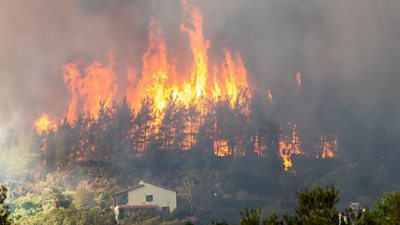When wildfires strike, people need reliable weather and climate information to prepare, cope and survive. Amid Algeria's severe wildfire season in summer 2024, we conducted research in the Kabylie region under the UK Met Office-funded Weather and Climate Information Services (WISER) Programme to understand how people were accessing and using weather and climate information.
Our study explored how people sought, interpreted, and responded to this information, the challenges they faced, and the role of the media in providing accurate and timely updates. We also aimed to identify their unmet information needs, and to examine the opportunities, barriers and support required for journalists as they reported on these issues.
Our findings will inform our work with media and guide the development of inclusive and impactful programming so that communities in Kabylie have the critical information they need, when they need it.
"We live in psychological turmoil, hoping not to burn out overnight! You can't fall asleep at night, you feel like every night is the night you're going to burn."
Our key findings included:
- Understanding of weather and climate: Participants associated weather primarily with daily temperature and general conditions, while climate was less understood and often confused with weather or linked to climate change. Many noted significant changes, including prolonged heatwaves, reduced snowfall, and increased drought.
- Wildfire awareness and impact: Most participants believed there was a connection between climate change and wildfires but saw human activity as the primary cause. Many shared personal experiences of loss and trauma due to wildfires, reinforcing the perception that wildfires have become a recurring threat.
- Sources of information: The internet and weather apps were the most preferred sources for weather updates. Algerian media was largely seen as unreliable. Participants preferred accessing weather and climate information in Amazigh and French. Social media played a critical role in real-time wildfire updates, often shared by ordinary people for their communities.
- Media perception and gaps: Algerian media was perceived as reactive rather than proactive in disaster reporting. Many participants distrusted official coverage of wildfires, which they believed was selective, embellished, or failed to provide full transparency. There was a strong demand for more accessible and practical early warning systems.
- Journalists’ perspectives and challenges: Interviews with journalists revealed that while they produced weather forecasts and environmental content, they faced several barriers, including difficulties in translating scientific terminology, limited expertise in climate science, lack of specialisation, and challenges in obtaining real-time footage of wildfires.
Our recommendations and key implications
Our findings highlighted the need for improved, reliable, and accessible weather and climate information, particularly around extreme events like wildfires. To enhance the role of media in raising awareness and improving preparedness, recommendations include:
- Early warning systems: Develop timely alerts for extreme weather events, including wildfires, with clear, actionable information.
- Educational content on wildfire preparedness: Create media programming that offers practical advice on prevention and response strategies, ensuring information is simple and easy to implement.
- Multilingual and accessible content: Ensure weather and climate information is available in Amazigh, French, and Arabic/Darija across multiple platforms. The language should be simplified, with scientific terms explained in a way that is understandable to all audiences.
- Strengthening media-expert collaboration: Foster stronger partnerships between journalists, scientists, local authorities, and civil society organizations to enhance the accuracy and reliability of climate reporting.
- Diverse and engaging formats: Use interactive programs, expert interviews, audience call-ins, and visual aids such as weather maps and infographics to make weather and climate information more accessible and engaging.
- Leveraging social media and community networks: Recognize the role of social media as a trusted source for real-time wildfire updates. Support community-driven information-sharing initiatives while addressing misinformation risks.
- Training and capacity building: Provide continuous training for journalists on climate science, crisis reporting, fact-checking, and effective communication of weather-related risks.
The research demonstrates an urgent need for proactive, localised, and trusted weather and wildfire information. Strengthening media capacity and ensuring reliable climate communication can significantly enhance community resilience in Algeria.
Read the formative research report
WISER Algeria was supported with funding from the UK Met Office.
Search by Tag:
- Tagged with Insight Insight
- Tagged with Algeria Algeria
- Tagged with Middle East and North Africa Middle East and North Africa
